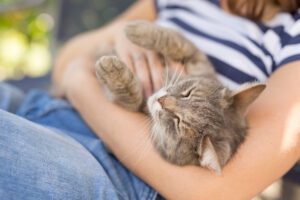Why Does My Cat Keep Purring?
Cats are fascinating creatures, and one of the most mysterious things they do is purr. If your cat purrs often, you might wonder what they’re trying to tell you. Purring is more than just a sound—it’s a form of communication that can mean different things depending on the situation. In this blog, we’ll talk about the various reasons your cat might be purring and what those purrs could be trying to convey. Whether they’re content, hungry, or even trying to heal themselves, your cat’s purrs are worth paying attention to.
If you’re curious about your cat’s behavior or need to make an appointment, call Carey Animal Hospital in Cincinnati, OH, at (513) 531-7117.

They Are Happy
One of the most common reasons your cat purrs is because they’re happy. Cats often purr when they feel relaxed, safe, and content. You might notice your cat purring while they’re lounging on your lap, enjoying a gentle petting session, or even while they’re kneading a soft blanket. This type of purring is usually steady and rhythmic, signaling that your cat feels at ease in their environment.
When your cat is in a familiar, comfortable setting, purring can be their way of showing that they’re enjoying the moment. It’s their version of a smile. If your cat purrs when you come home or when you’re spending quiet time together, it’s a sign of their affection for you. This happy purring is one of the many ways cats bond with their owners, strengthening the connection between you.
While happiness is a common reason for cat purring, it’s not the only one.
They Are Hungry or Want Something
Cats are clever creatures, and they know how to get your attention when they want something—like food! Some cats purr to signal that they’re hungry or in need of something else, like a treat, fresh water, or even just some extra attention. This type of purring might sound a bit different from their happy purr. It can be more insistent, with a slightly higher pitch or a quicker rhythm.
You might notice your cat purring more persistently around mealtime or when you’re in the kitchen preparing food. This purring is often accompanied by other behaviors, such as rubbing against your legs, following you around, or vocalizing in short meows. It’s their way of saying, “Hey, I’m here, and I’m hungry!”
Understanding this type of purring can help you respond to your cat’s needs more effectively. If you notice your cat purring in this way outside of mealtime, it might be their way of asking for something else, like playtime or a clean litter box. Paying attention to their signals can help you take better care of your cat’s daily needs.
Kitten-Mother Connection
Purring starts early in a cat’s life. Kittens begin to purr when they are just a few days old. This early purring serves a special purpose—it helps kittens communicate with their mother. When kittens purr, they signal to their mother that they are nearby, feeling safe, and in need of care. The mother cat also purrs back, creating a comforting and secure environment for her young.
This purring connection between mother and kitten plays a crucial role in their early development. It helps strengthen their bond and ensures that the kittens stay close to their mother, who provides them with warmth, food, and protection. As the kittens grow, they continue to purr to communicate with their mother, letting her know they are content or in need of attention.
Even as adult cats, this early experience with purring carries over into their interactions with humans. When your cat purrs while being held or when they’re close to you, they might recall the comfort and security they felt as kittens. This purring can be a sign that they see you as a source of safety and care, much like their mother.
Relief and Healing
Interestingly, cats also purr when they are in discomfort or trying to heal themselves. This might seem surprising, but research suggests that purring can have a therapeutic effect on cats. The low-frequency vibrations of a cat’s purr are believed to promote healing and reduce pain. This type of purring is often seen when a cat is recovering from an injury, feeling stressed, or even during visits to the vet.
If your cat is purring while they’re resting after an injury or during a stressful situation, it might be their way of comforting themselves. These vibrations can help soothe sore muscles, reduce swelling, and even heal broken bones. It’s as if cats have their own built-in healing mechanism!
Additionally, cats may purr to calm themselves when they’re feeling anxious or scared. For example, if your cat is purring during a thunderstorm or a trip to the vet, they might be trying to keep themselves calm. This self-soothing behavior shows how resilient cats can be, using purring as a natural way to cope with physical and emotional stress.
When Should You Call Us?
While purring is usually a positive sign, it’s important to pay attention to the context. If your cat is purring but also showing signs of discomfort, like hiding, refusing to eat, or displaying unusual behavior, it could mean that something is wrong. Cats are masters at hiding their pain, so purring might be their way of coping with something more serious. In these cases, you should always consult your vet to make sure your cat is healthy and comfortable.
At Carey Animal Hospital in Cincinnati, OH, we’re here to help you understand your cat’s behavior and provide the care they need. If you’re concerned about your cat’s purring or any other aspect of their health, don’t hesitate to call us at (513) 531-7117 or make an appointment today.

